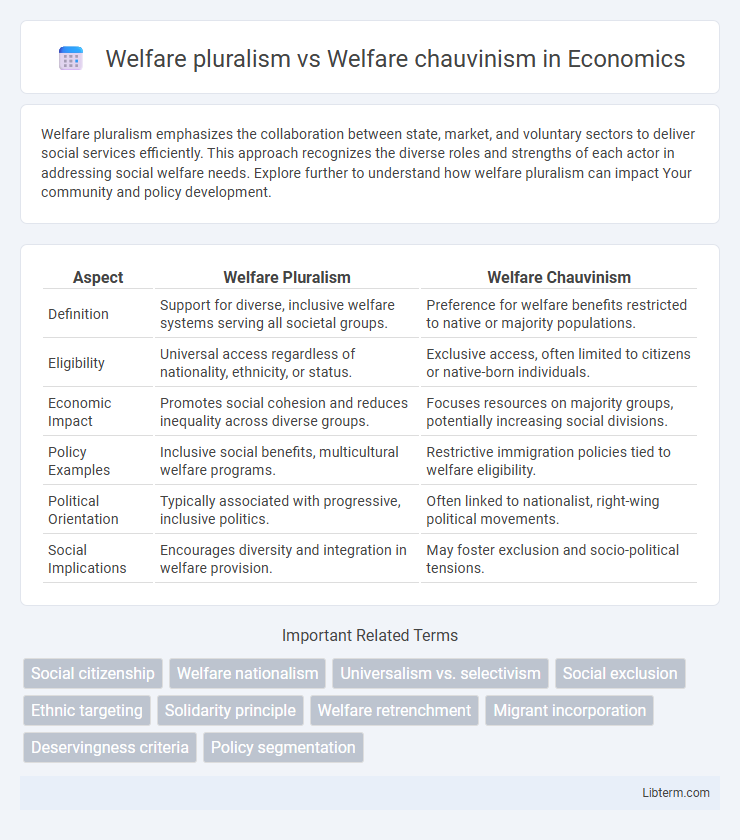Welfare pluralism emphasizes the collaboration between state, market, and voluntary sectors to deliver social services efficiently. This approach recognizes the diverse roles and strengths of each actor in addressing social welfare needs. Explore further to understand how welfare pluralism can impact Your community and policy development.
Table of Comparison
| Aspect | Welfare Pluralism | Welfare Chauvinism |
|---|---|---|
| Definition | Support for diverse, inclusive welfare systems serving all societal groups. | Preference for welfare benefits restricted to native or majority populations. |
| Eligibility | Universal access regardless of nationality, ethnicity, or status. | Exclusive access, often limited to citizens or native-born individuals. |
| Economic Impact | Promotes social cohesion and reduces inequality across diverse groups. | Focuses resources on majority groups, potentially increasing social divisions. |
| Policy Examples | Inclusive social benefits, multicultural welfare programs. | Restrictive immigration policies tied to welfare eligibility. |
| Political Orientation | Typically associated with progressive, inclusive politics. | Often linked to nationalist, right-wing political movements. |
| Social Implications | Encourages diversity and integration in welfare provision. | May foster exclusion and socio-political tensions. |
Understanding Welfare Pluralism
Welfare pluralism promotes diverse sources of social support, including the state, private sector, and voluntary organizations, ensuring inclusive access to welfare benefits for all societal groups. It contrasts sharply with welfare chauvinism, which restricts welfare benefits to native citizens or dominant cultural groups, often excluding immigrants or minorities. Understanding welfare pluralism involves recognizing its emphasis on collaboration among multiple stakeholders to create a comprehensive and equitable social safety net.
Defining Welfare Chauvinism
Welfare chauvinism defines social benefits exclusively for native-born citizens, excluding immigrants and minority groups from access to welfare programs. This ideology prioritizes national identity and cultural homogeneity in the distribution of state resources, often linked to right-wing populist movements. In contrast, welfare pluralism supports an inclusive, diverse approach to social welfare, advocating equal access regardless of ethnicity or origin.
Historical Contexts of Welfare Pluralism and Chauvinism
Welfare pluralism emerged in the mid-20th century as diverse social groups and private organizations increasingly contributed to social welfare provision alongside the state, reflecting a shift from state-centric models to multi-actor involvement in countries like Sweden and Germany. Welfare chauvinism gained prominence in the late 20th and early 21st centuries amid rising nationalism and anti-immigration sentiments, particularly in Western Europe, advocating social benefits be reserved strictly for native-born citizens. These contrasting historical contexts highlight welfare pluralism's inclusive approach to social support versus welfare chauvinism's exclusionary policies tied to ethnicity and citizenship.
Key Differences between Welfare Pluralism and Chauvinism
Welfare pluralism advocates for inclusive social policies that support diverse groups equitably, emphasizing cooperation among various welfare providers including the state, private sector, and civil society. In contrast, welfare chauvinism prioritizes welfare benefits exclusively for native citizens, often restricting access for immigrants and minorities based on nationalistic or ethnocentric criteria. The key differences lie in their approach to eligibility and inclusivity, with pluralism promoting broad access and chauvinism enforcing selective distribution based on identity or origin.
Social Inclusion in Welfare Pluralism
Welfare pluralism promotes social inclusion by recognizing diverse actors such as government, private sectors, and community organizations in delivering welfare services, ensuring broader access for marginalized groups. This approach fosters cooperation between multiple providers, enhancing tailored support for vulnerable populations and reducing social exclusion. In contrast, welfare chauvinism restricts access to welfare benefits based on ethnic or national identity, undermining social cohesion and excluding minority groups from essential social services.
National Identity and Welfare Chauvinism
Welfare chauvinism emphasizes restricting welfare benefits to native-born citizens, reinforcing a national identity that excludes immigrants and minorities from social protection systems. This approach links national belonging with entitlement to state resources, promoting exclusionary policies that prioritize citizens over non-citizens. Contrasting with welfare pluralism, which advocates for inclusive social rights regardless of background, welfare chauvinism grounds its legitimacy in preserving a homogeneous national identity through selective welfare access.
Policy Implications of Each Welfare Approach
Welfare pluralism promotes inclusive social policies that extend benefits regardless of ethnicity or nationality, encouraging multicultural integration and social cohesion. In contrast, welfare chauvinism advocates for restrictive policies that prioritize welfare access primarily to native citizens, often leading to exclusionary practices and nationalist-driven reforms. The policy implications of welfare pluralism support diversity and equal rights, while welfare chauvinism fosters protectionism and potentially increased social divisions.
Impact on Immigrant and Minority Communities
Welfare pluralism supports inclusive social policies that extend benefits to immigrant and minority communities, promoting social integration and reducing inequality. Welfare chauvinism advocates for restricting welfare access to native-born citizens, often resulting in marginalized immigrant populations facing increased economic hardship and social exclusion. This exclusionary approach exacerbates disparities and hinders efforts to build cohesive, diverse societies.
Debates and Criticisms Surrounding Welfare Models
Debates surrounding welfare pluralism emphasize its inclusive approach to diverse social needs through multiple providers, contrasting with welfare chauvinism's restrictive policies favoring native populations. Critics argue welfare pluralism may lead to fragmentation and inequality in service provision, while welfare chauvinism faces condemnation for fostering exclusion and discrimination against immigrants. These conflicting models highlight tensions between social cohesion, equality, and national identity in welfare policy discussions.
Future Trends in Welfare Philosophy
Future trends in welfare philosophy reveal a growing tension between welfare pluralism, which advocates for inclusive and diverse social support systems, and welfare chauvinism, emphasizing protectionist policies favoring native populations. Technological advancements and globalization are expected to intensify debates on resource allocation, influencing policy shifts toward more selective welfare models. Demographic changes, such as aging populations and migration patterns, will further shape discussions on the sustainability and fairness of welfare states in coming decades.
Welfare pluralism Infographic

 libterm.com
libterm.com